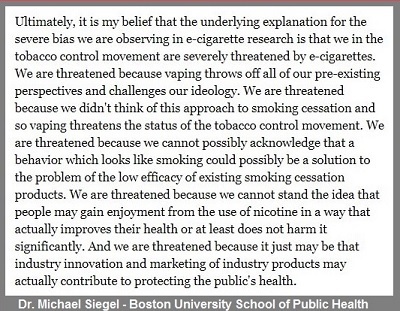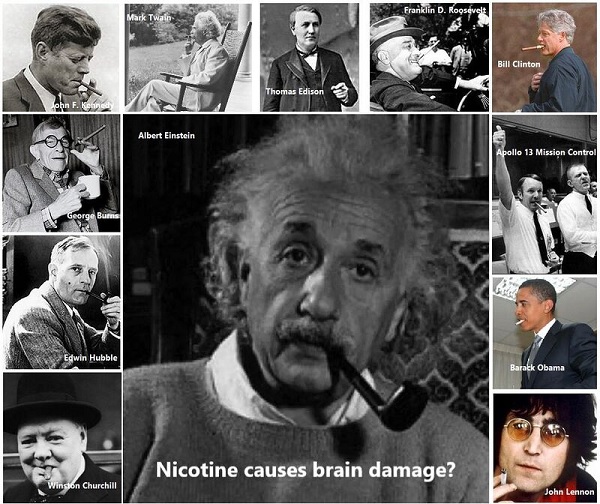Myth Busting: Difference between revisions
Jump to navigation
Jump to search
Richardpruen (talk | contribs) Added link to Mythbusters page |
|||
| Line 110: | Line 110: | ||
=<span style="background-color: rgb(51, 254, 255);" data-mce-style="background-color: #33FEFF;">Myth</span> ENDS - Gateway to smoking= | =<span style="background-color: rgb(51, 254, 255);" data-mce-style="background-color: #33FEFF;">Myth</span> ENDS - Gateway to smoking= | ||
Revision as of 11:48, 22 July 2024

Here we take a look at busting myths and debunking junk science about nicotine or products containing nicotine.
- ^ Link will take you to the page with information about nicotine and cancer concerns
Myth ENDS - COVID/EVALI/Respiratory Disease caused by vaping/nicotine
- See Also:
2021: Truth Testimony in Netherlands pertaining to a potential flavour / flavor ban: Regulation of e-cigarette flavours – a response
- Signed by 24 experts from around the world
- Covers 12 key points
2020: Truth Letter: E-Cigarette Use and COVID-19: Questioning Data Reliability
- The link between ever, but not current, ecigarette use and COVID-19 suffers from biological implausibility.
- A number of experts responded swiftly to the study's abnormal findings that lacked a credible causal theory.
- The re-analysis by Kenkel and colleagues should prompt the American Journal of Preventive Medicine’s editors to revisit their decision to publish Bhatta and Glantz’s latest study.
- Cornell University researchers, led by economics professor Don Kenkel, have published a comprehensive re-analysis of the study "Association of E-Cigarette Use With Respiratory Disease Among Adults: A Longitudinal Analysis", concluding: “We find no evidence that current or former e-cigarette use is associated with respiratory disease.” Their paper on the topic: E-Cigarettes and Respiratory Disease: A Replication, Extension, and Future Directions
- Debunked study: Association of E-Cigarette Use With Respiratory Disease Among Adults: A Longitudinal Analysis
- Debunked press release: E-Cigarettes Significantly Raise Risk of Chronic Lung Disease, First Long-Term Study Finds
2018: Truth Dr. Farsalinos Disputes Wet Lung Linked to Vapor
- There is no such thing as a 'wet lung.' This is neither a scientific term nor a medical condition. The case report that was accompanied by a press statement refers to hypersensitivity pneumonitis. This is a condition caused by a form of an allergic reaction that results in an inflammatory response.
- Debunked article: Teen develops "wet lung" after vaping for 3 weeks
2016: Truth New Study on E-Cigarettes and Bronchitis: An Example of Scientific Dishonesty and Deception
- The rest of the story is that essentially what we have here is an example of scientific dishonesty and apparently intentional deception of the journal readers and the public. For a movement that has devoted so much attention to attacking the tobacco industry for its deception and scientific dishonesty, I believe that we need to adhere to the highest standards of honesty and transparency in our scientific reporting. This is not happening in our reporting of the health effects of vaping, and it is certainly not happening in this study and the dissemination of its results.
- Debunked Abstract of: Electronic Cigarette Use and Respiratory Symptoms in Adolescents
- Debunked Press Release: E-cigarette use linked to risk of respiratory symptoms among adolescents
2019: Research Notes Minnesota Smoke-Free Alliance THC Cutting Agents
- Research on the products use to cut THC containing liquids that led to the outbreak of EVALI / VALI / THCVALI. This outbreak was falsely blamed on the nicotine vaping industry (ENDS).
Myth ENDS exhaled/inhaled vapor contains dangerous levels of toxic chemicals/VOCs
2018: Truth Paper: E-cigarette flavors and aldehyde emissions: another failure to verify findings from a previous study
- Our results were revealing in identifying a very small contribution of flavorings on aldehyde emissions. In fact, aldehyde levels were so low that consumption of 5 grams liquid per day would expose vapers to less formaldehyde and acetaldehyde than just staying at home and breathing air. For acrolein, exposure was orders of magnitude lower compared to NIOSH-defined recommended safety limits. To give you an idea of the differences in results, the authors of the original study found up to 7000 ug/g formaldehyde, while we found a maximum of 62 ug/g.
- 2017: Truth Study: Do flavouring compounds contribute to aldehyde emissions in e-cigarettes?
- In conclusion, we confirmed that flavouring compounds can contribute to aldehyde emissions from ECs, but such contribution, detected in only 3 liquids and two flavours herein, was minimal.
- 2016: Debunked Study: Flavoring Compounds Dominate Toxic Aldehyde Production during E-Cigarette Vaping
- The concentration increases of nicotine and formaldehyde were small when compared with those described in other studies of indoor atmospheres or health regulatory thresholds. No significant changes were observed when comparing the concentrations of exhaled breath in vaping and no vaping days. Even the exhaled breath nicotine concentrations in both conditions were similar. As expected, toluene, xylenes, benzene, ethylbenzene, and naphthalene did not show increases in the vaping days since combustion was not involved.
- Obviously, smokers or vapers do not hold their breath for 20 seconds before exhaling the breath. Thus, the study probably overestimated the absorption rate of VOCs present in cigarette smoke or e-cigarette aerosol.
- The results of the study basically showed that indoor air and normal exhaled breath contains more VOCs that the e-cigarette aerosol.
- 2015 Truth Study: A rapid method for the chromatographic analysis of volatile organic compounds in exhaled breath of tobacco cigarette and electronic cigarette smokers
- Tobacco cigarette smoke provided the samples containing highest concentrations of all compounds analyzed. Besides nicotine it contained benzene, toluene, xylenes, ethylbenzene and naphthalene in high abundance as well as other compounds such as isoprene, pent-1-ene, n-pentane, n-hexane, n-heptane and others.
- This composition was in strong contrast with that of vapor from the e-cigarettes in which all these compounds were virtually absent except nicotine
- 2020: Debunked Article: Vaping regulations, teen use remain hot topics
- Research shows that secondhand aerosol from vapes and e-cigarettes may expose bystanders to nicotine, heavy metals, ultrafine particulates, volatile organic compounds and other toxicants.
- The findings of this work suggest that exhaled e-cigarette aerosol does not increase bystander exposure for phenolics and carbonyls above the levels observed in exhaled breaths of air, in contrast to the quantifiable levels of these analytes in exhaled conventional cigarette smoke.
- Lorillard study
Myth ENDS - Flavor Danger
- We look at 2 important questions: 1) Is vaping flavors toxic and 2) Are flavors motivating non-smoking teens to experiment with vaping?
2021: Truth Testimony in Netherlands pertaining to a potential flavour / flavor ban: Regulation of e-cigarette flavours – a response
- Signed by 24 experts from around the world
- Covers 12 key points
2019: Truth Article: The US vaping flavour (flavor) ban: twenty things you should know
- A well researched article that touches on many of the myths and fears about youth use of flavored vapor products.
2017: Truth Follow Up: Comment on “Flavoring Compounds Dominate Toxic Aldehyde Production during E Cigarette Vaping”
- We would like to point out that the finding is in a stark contrast to previous results.
- The high levels only happen under dry puff conditions, something avoided by vapers as it is very unpleasant.
- 2016: Debunked Study: Flavoring Compounds Dominate Toxic Aldehyde Production during E-Cigarette Vaping
Myth ENDS - Formaldehyde is at dangerous levels
- In realistic conditions, formaldehyde in e-cigarettes is lower than cigarette smoke.
- High levels of formaldehyde in e-cigarettes are produced in unrealistic (dry puff) conditions and should be avoided in the laboratory setting.
- 2018 Truth Article: Farsalinos Exposes Faults in Formaldehyde Vape Studies
- While direct replications like this and studies with similar methods can offer useful comparisons, the main point of the paper isn’t as much about the results as it is about the methods. Before we can really answer the key questions, we need to consider why the method used matters so much.
- 2015: Debunked Letter: Hidden Formaldehyde in E-Cigarette Aerosols
Myth ENDS - Gateway to smoking
2021: Truth Testimony in Netherlands pertaining to a potential flavour / flavor ban: Regulation of e-cigarette flavours – a response
- Signed by 24 experts from around the world
- Covers 12 key points
- The recent studies claiming vaping leads to smoking only prove that youths experiment, and they cannot show the true cause behind teen smoking, which is at a record low.
- The Chaffee article emphasizes odds ratios but omits or obscures important contextual information. While teens who try one tobacco product are more likely to try another, the dominant gateway in the PATH survey was from no previous tobacco use to cigarettes.
- The hysteria over vaping allegedly serving as a gateway to smoking for teens is unfounded and goes against scientific evidence, according to a new study.
2016: Truth Blog: How not to be duped by gateway effect claims
- There are just too many desperately biased academic papers making ridiculous claims based on data and methods that could never describe a gateway effect. We should be looking at what is happening to the main trends in youth smoking, and this shows rapid declines in smoking and at a faster rate as vaping has risen. When you look at the full picture the data far more consistent with the vaping gateway being an ‘exit’ from smoking than an entrance.
- Truth Blog: New Pediatrics Study Provides Absolutely No Evidence that E-Cigarettes are a Gateway to Smoking
- The study counted anyone who had even puffed a cigarette once as being a smoker. So theoretically, a subject could have had a single puff of an e-cigarette and hated it, and then had a single puff of a cigarette and hated it, and they would be considered someone who initiated smoking because of vaping first.
- Truth Statements: Expert reaction to study on e-cigarettes and future cigarette use
- Prof. Ann McNeill, Professor of Tobacco Addiction at the Institute of Psychiatry, Psychology & Neuroscience, King’s College London
- “The gateway hypothesis in the addictions field is frequently used but is highly contested as it has a poor evidence base in general. This study does nothing to strengthen that evidence base.”
- Prof. Peter Hajek, Director of the Tobacco Dependence Research Unit at Queen Mary University of London
- "Like several previous studies of this type, this one just shows that people who try things, try things."
- Debunked Study: E-Cigarettes and Future Cigarette Use
- Debunked Article: Vaping teens more apt to move on to regular cigarettes: U.S. study
- The simple counts of when subjects first tried a cigarette show earlier smoking among those who had tried e-cigarettes as compared to those who never tried e-cigarettes, which by itself is enough to favor the THR interpretation over the gateway interpretation.
Myth ENDS - Heavy Metals at dangerous levels
2018: Truth Article: Heavy Metal
- Studies like the 2018 one from the Johns Hopkins Bloomberg School of Public Health claimed they found substantial levels of toxic heavy metals in eliquid and vapour. The results have then been used as part of overexcited lectures to the media by the likes of the lamentable Bonnie Halpern-Felsher. A study from researchers at West Virginia University pours cold water over the argument by finding that vapers’ blood and urine matches those who neither vape or smoke.
- 2018: Truth Article: Dr. Farsalinos Discredits “Toxic Metal” Study For Being Misleading
- “The ‘significant amount’ of metals the authors reported they found were measured in ug/kg. In fact, they are so low that for some cases (chromium and lead) I calculated that you need to vape more than 100 ml per day in order to exceed the FDA limits for daily intake from inhalation medications.” He suggested that this happens because studies sometimes use concentration limits associated with constant intake, as opposed to just the breaths that include e-liquid vapor. According to Farsalinos, “humans take more than 17,000 breaths per day but only 400-600 puffs per day from an e-cigarette.” So when researchers calculations omit this fact, the results can appear drastically worse than they ought too.
- 2020: Truth Study: Association of electronic cigarette use with lead, cadmium, barium, and antimony body burden: NHANES 2015-2016
- Blood lead levels, and urinary cadmium, barium, and antimony levels were similar between participants who used e-cigarettes and participants who did not.
- 2015: Truth Study: Are Metals Emitted from Electronic Cigarettes a Reason for Health Concern? A Risk-Assessment Analysis of Currently Available Literature
- Based on currently available data, overall exposure to metals from EC use is not expected to be of significant health concern for smokers switching to EC use, but is an unnecessary source of exposure for never-smokers. Metal analysis should be expanded to more products and exposure can be further reduced through improvements in product quality and appropriate choice of materials.
- Article about above study: Metals emitted from e-cigarettes are NOT a reason for health concern
- 2018: Debunked Study: Metal Concentrations in e-Cigarette Liquid and Aerosol Samples: The Contribution of Metallic Coils
- 2013: Debunked Study: Metal and silicate particles including nanoparticles are present in electronic cigarette cartomizer fluid and aerosol
Myth ENDS - Heart Disease caused by vaping
2020: Retraction Explanation: Retraction to: Electronic Cigarette Use and Myocardial Infarction Among Adults in the US Population Assessment of Tobacco and Health
- Given these issues, the editors are concerned that the study conclusion is unreliable.
- The editors hereby retract the article from publication in Journal of the American Heart Association
- News items regarding the retraction
- USA Today A study claimed vaping doubles risk for heart attacks. It's been retracted for being 'unreliable'
- USA Today Study linking vaping to heart attacks muddied amid spat between two tobacco researchers
- Vaping 360 Journal Retracts "Unreliable" Glantz Study Tying Vaping to Heart Attacks
- Comments and questions from experts around the world
- Includes and excellent time line of events with links.
- Dr Farsalinos: “Increasing the risk” means that someone is FIRST exposed to a condition (in this case, exposed to e-cigarette use) and THEN, BECAUSE OF THIS EXPOSURE, he/she develops disease. Both studies CANNOT provide any of this information to substantiate an increased risk. Both are cross-sectional surveys, meaning that they asked participants if they have heart disease and if they use e-cigarettes. The studies provide no information on whether e-cigarette use was initiated before (and how long before) or after the development of disease. What if participants used e-cigarettes after they developed the disease in order to quit smoking?
- Letter encouraging retraction / correction by David B. Abrams, PhD; Kenneth Michael Cummings, PhD; George Davey Smith; Konstantinos Farsalinos, MD, MPH; Jonathan Foulds, PhD; Abigail Friedman, PhD; Thomas Glynn, PhD; Peter Hajek, PhD; Martin Jarvis, DSc OBE; Robert Kaestner, PhD; Ann McNeill, PhD; Marcus Munafò, PhD; Raymond Niaura, PhD; David Sweanor, JD; David Timberlake, PhD; Kenneth Warner, PhD
- Truth 2019: Association of Electronic Cigarette Use With Myocardial Infarction: Persistent Uncertainty.
- According to their results, MI risk is lower in daily EC users compared with daily TC smokers, although both are worse than nonsmokers. Perhaps this is another message of the study, and TC smokers, if unable or unwilling to quit entirely, should be encouraged to switch to ECs, potentially saving thousands of lives.4 This harm reduction strategy has been embraced successfully in England,5 and we would argue, should be considered more widely
- Debunked study: Association Between Electronic Cigarette Use and Myocardial Infarction
- Debunked conference abstract: E-cigarettes linked to higher risk of stroke, heart attack, diseased arteries
- Debunked Medical Xpress article: E-cigarettes linked to higher risk of stroke, heart attack, diseased arteries
2016: Truth Comment: Response to stories suggesting that vaping is as bad for the heart as cigarettes
- Professor Peter Hajek: “The study is reporting on a well-known short-term effect of nicotine – stiffening of arteries – that accompanies all types of stimulation. The same effect is generated by watching a thriller or a football match or sitting an exam. Drinking a cup of coffee actually produces a larger response of much longer duration. The key heart health risks of smoking are not caused by nicotine but by other chemicals in tobacco smoke that are not present in e-cigarette vapour.”
- Debunked Study: Electronic Cigarette Smoking Increases Aortic Stiffness and Blood Pressure in Young Smokers
- Debunked Article: E-cigarettes are 'as bad for the heart as tobacco': Nicotine vapour damages blood vessels and raises risk of disease
Myth ENDS - Marketing to Kids
2016: Truth Video: E-Cigs and Joe Camel | Dr. Steven J. Allen
- Capital Research Center
- Covers many of the accusations made towards the ENDS industry and compares them to several adult consumer products and adult activities.
Myths ENDS - Multiple Myths
Multi-Year Research Notes Mysterious illnesses and symptoms are often blamed on "vaping"
- Using the word "vaping" often makes people assume that it means ENDS and the use of nicotine products. The media, public health, and law makers compound the issue by not being clear on what they're talking about. Very often, these problems are not caused by nicotine products, but the use of drugs in electronic inhalation devices. This research project gives several examples of mystery illnesses and the causes.
- Comments on several misperceptions from a study
- 8 Things that you should know, Covers myths around EVALI etc.
- Not surprisingly, there are lots of inaccuracies and misconceptions about e-cigarettes and vaping. This blog looks at some of the most common myths and provides the facts.
- We read with serious concern the position article by Reynales-Shigematsu et al. about combustion-free nicotine delivery products and public health [1]. The authors not only fail to present a balanced overview of the risk-benefit ratio of these new technologies, but grossly misrepresent the existing evidence and ignore the broad consensus that Electronic Nicotine Delivery Systems (ENDS), Alternative Nicotine Delivery Systems (ANDS), and E-Cigs (electronic cigarettes or vaporizers) use is considerably less harmful than continuation of smoking [2-6]. By placing a greater emphasis on potential risks and disregarding possible benefits the authors fail to consider that ENDS, ANDS and E-Cigs use may represent an opportunity for public health.
- This study is deeply flawed because it fails to consider the most likely explanation for the study findings: that people who use e-cigarettes more likely have a history of more intense smoking than people who do not use e-cigarettes. For example, one study found that while only 21% of adult smokers who did not vape were heavy smokers, 68% of adult smokers who did vape were heavy smokers (or had been heavy smokers).
2019: Vaping risk compared to smoking: challenging a false and dangerous claim by Professor Stanton Glantz
- In this blog, I examine an extraordinary claim by Professor Stanton Glantz of the University of California at San Francisco. Professor Glantz claims that the US public is right to believe that vaping is as harmful as smoking and that science is now catching up with public opinion.
2019: Bloomberg’s Hitjob
Myth ENDS - Popcorn Lung caused by vaping
2020: Article: Does Diacetyl in Vaping Cause Popcorn Lung?
- While almost anything is possible, there’s simply no evidence that vaping causes popcorn lung.
2019: Cancer Research UK: Does vaping cause popcorn lung?
- No. There’s no good evidence that e-cigarettes could cause the lung condition called popcorn lung. There’s been no confirmed cases of popcorn lung reported in people who use e-cigarettes.
- There is 750x more diacetyl in a pack of cigarettes than there is in a days worth of vaping nicotine fluid, and to date we have no confirmation that smokers are getting popcorn lung.
- It was shocking to see a public statement reporting a case of popcorn lung disease in a patient using e-cigarettes. The title of the public release is: “Case report finds 'popcorn lung' in patient using e-cigarettes. Report points to possibility of diacetyl, a flavoring agent in e-cigarettes, to bronchiolitis obliterans syndrome”
- The case report is NOT about popcorn lung disease (bronchiolitis obliterans) but about a case of acute hypersensitivity pneumonitis. The article then goes on to explain why it can’t be popcorn lung.
- Debunked Case report finds 'popcorn lung' in patient using e-cigarettes
- Debunked Case report finds acute hypersensitivity pneumonitis in patient using e-cigarettes
2015 New Study Finds that Average Diacetyl Exposure from Vaping is 750 Times Lower than from Smoking
- There's just one minor fact that is omitted completely in the article, as well as in all the media coverage.
- That fact: All conventional cigarettes produce tobacco smoke that contains diacetyl, and the levels of diacetyl in cigarettes are a lot higher than those produced by e-cigarettes.
Myth ENDS - Youth use of vapor products
- See also Youth Epidemic
2021: Truth Testimony in Netherlands pertaining to a potential flavour / flavor ban: Regulation of e-cigarette flavours – a response
- Signed by 24 experts from around the world
- Covers 12 key points
2020: Canada takes a wrong turn after a flawed paper induces moral panic about youth vaping and smoking
Myth Nicotine - dangers and addiction
2015: The Great Nicotine Myth
- There are four nicotine myths perpetuated in modern culture that have no basis in fact.
- As a result, the present SG's chapter on nicotine addiction, which purportedly "documents how nicotine compares with heroin and cocaine in its hold on users and its effects on the brain," is remarkably biased and misleading.
Myth THR - Articles give fuel to myths
- A number of consumer groups and public health experts, have raised serious concerns about the bias and false claims made by a recent University of Bath study, which explored the Twitter activity around the eighth meeting of the Conference of the Parties to the World Health Organisation (WHO) Framework Convention on Tobacco Control.
Myth Videos about myths
Long video with evidence on vaping myths!
Shorter video with less evidence presented, but more common sense!
Bell jar experiment by Public Health England!
Graphics and Memes about Nicotine Myths
sets of ready to use graphic images and posts in multiple languages.
- Possible explanation for the lack of unbiased research in the United States
- There is a false accusation that Cotton Candy flavors are made to market ENDS products to children. The truth is, that adults find the flavor very appealing.
- If nicotine causes brain damage, how do we explain the accomplishments of these people?
Suggestions of items to add to this page
Add seizure myth
- The statistical associations between e-cigarette use and respiratory disease are driven by e-cigarette users who are also current or former smokers of combustible tobacco.
- A striking feature of the data is that almost all e-cigarette users were either current or former smokers of combustible tobacco.
- Among respondents who had never smoked combustible tobacco, we find no evidence that current or former e-cigarette use is associated with respiratory disease.
2020: Article: Most Young People Do Not Vape, and Even Fewer Vape Regularly
2020: Truth Blog: Dodgy stats on the Gateway Hypothesis
2015: Truth Blog: Is “ecigs are a gateway” the new “addiction”? (i.e., fiercely debated in the absence of defining the term)
2015: Truth Statement: settings Open AccessArticle Gateway Effects: Why the Cited Evidence Does Not Support Their Existence for Low-Risk Tobacco Products (and What Evidence Would)
2015: Truth Blog: JAMA paper finds some adolescents experiment with stuff – so what?
2014: Truth Evaluation: Youth Experimentation With e-Cigarettes Another Interpretation of the Data
2013: Truth Blog: We need to talk about the children – the gateway effect examined
More Information
- Click on the category link below for more studies by topic on ENDS and Nicotine.


